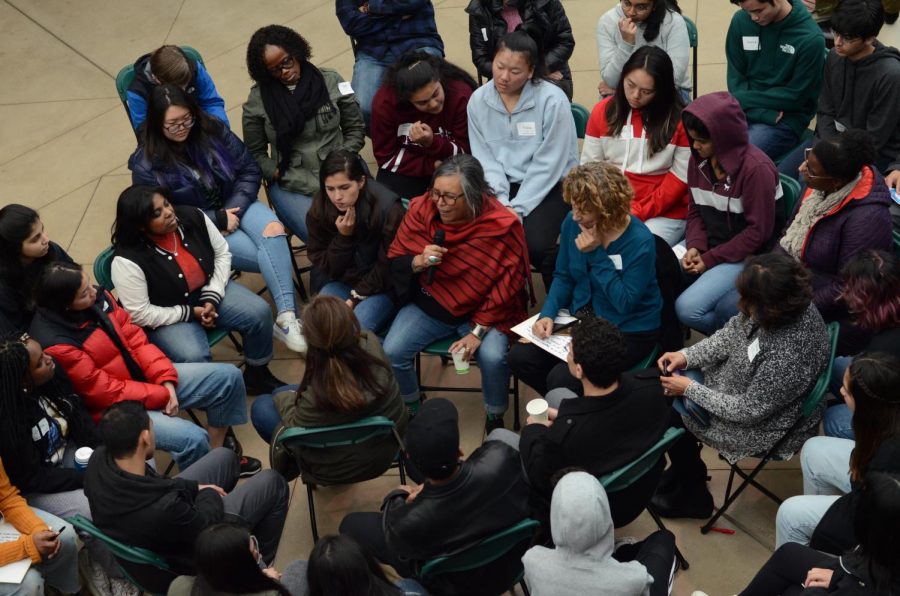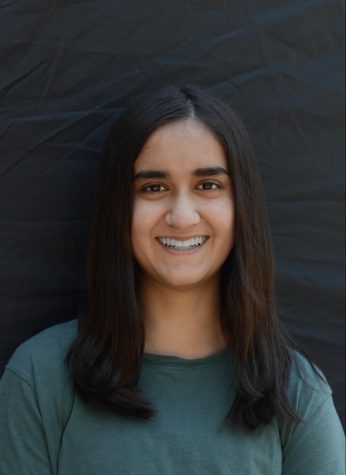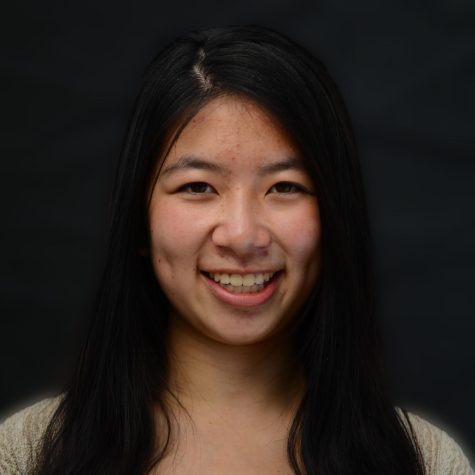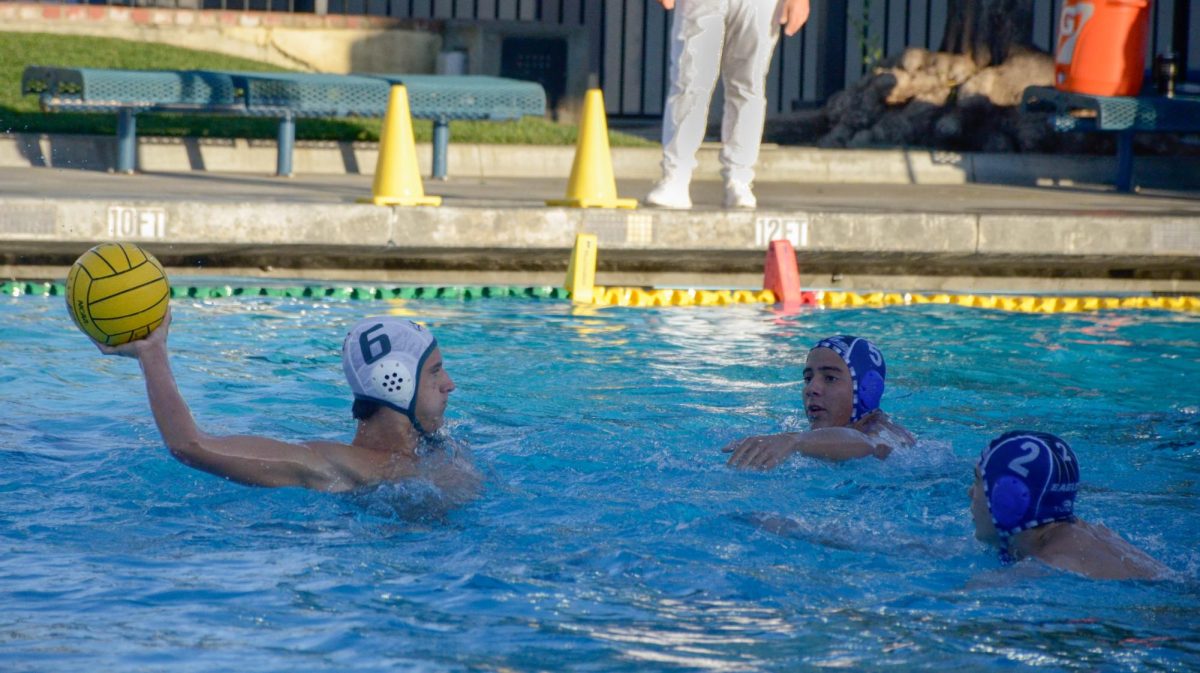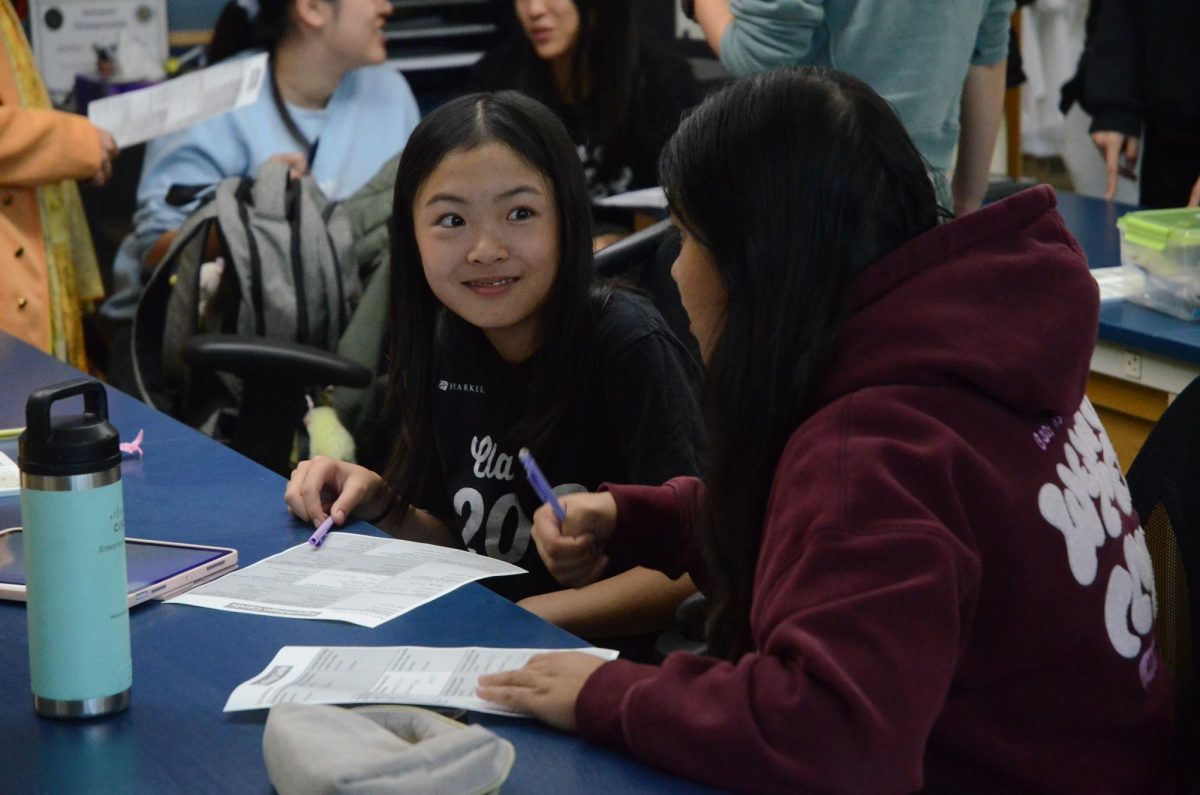Inside the fishbowl: Students explore diversity and race at the Student Diversity Leadership Gathering
Attendees at the second annual Student Diversity Leadership Gathering participate in the fishbowl activity. In the “fishbowl activity,” chairs were set up in the center of the room with people of color in the middle and white people forming a ring around them. Featured speaker and organizer Dr. Rodney Glasgow showed three videos to prompt discussion.
January 23, 2020
The Diversity Committee hosted the second Student Diversity Leadership Gathering at the upper school on January 20 from 8 a.m. from 4 p.m., and it was also Martin Luther King Jr. Day, a day on which people reflect on the civil rights activist’s work during the Civil Rights Movement and his hopes for the future.
This gathering provided students and adults with the opportunity to speak about important issues regarding diversity. Students from both Harker and other local private schools heard from Dr. Rodney Glasgow, a nationally-recognized speaker in promoting diversity and inclusion, and participated in several group activities.
Having the gathering on Martin Luther King Jr. Day was important because this event focused on diversity and equity.
“Last year, when we had the first event, it was with the intention of having it be an annual thing because it kind of falls towards Black History Month, so dealing with issues of race and diversity and inclusion.” said upper school math teacher Dr. Lola Muldrew, a co-chair of the Harker Diversity Committee. “I wanted to bring something that was acknowledging and reflecting upon all those sorts of things that Dr. Martin Luther King Jr. spent all his energy on.”
Dr. Glasgow organized most of the event, and he led the group activities at the gathering, such as a Ghost Walk and a “fishbowl activity”; attendees also watched part of “Chinglish,” one of the Student Directed Showcase productions.
“My favorite part of the event so far was the speech because it was really inspiring and it showed me a perspective that I never really thought about before,” said Keesha Gondipalli (9), who attended the gathering.
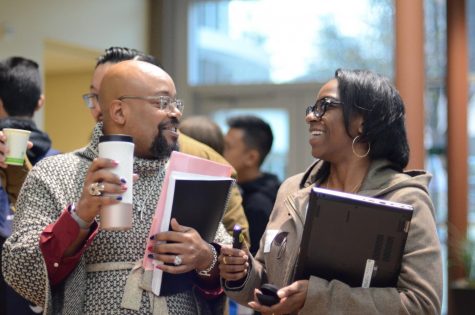
Dr. Rodney Glasgow converses with Diversity Committee co-chair Tyeshia Brown. The Diversity Committee worked with Dr. Glasgow to organize the gathering.
The initial idea of hosting this event came from how upper school students were unable to attend the Student Diversity Leadership Conference (SDLC) in Nashville last year, as the Diversity Committee could not secure spots for them. As a result, the co-chairs, Muldrew, upper school art teacher Pilar Aguero-Esparza, history teacher Mark Janda and Tyeshia Brown, contacted Dr. Glasgow last year about a possible event at Harker, and they decided to host another this year.
“At the end of the conference last year, or the gathering last year, we asked him, ‘So Dr. Glasgow, would you come again next year?’ And he said, ‘Of course, I thought that’s what I was going to do,’ right, which was, that’s the kind of person he is,” said upper school art teacher Pilar Aguero-Esparza, a co-chair of the Diversity Committee.
The Diversity Committee also decided to make a change this year for the second event; instead of separating students from adults, they decided to have them participate in the activities together.
“It made it deeper, because I think it was important for students to hear where adults were, adults to hear how students think on these issues, for administrators to hear their teachers say, I really need you in this, I need to hear your voice,” Dr. Glasgow said. “For students to hear teachers talking about, we have a power thing too, right, there’s somebody over us, that even we feel like we can’t speak sometimes.”
Mixing the students and teachers together also affected which activities Dr. Glasgow decided on for the event.
“I used some activities I would use with students, and then modified them a little bit to help us get over some of those barriers that when you have students and adults together, right, can make people not participate as much, so I kind of tailored them, knowing the age range we had in the room,” Dr. Glasgow said.
In the “fishbowl activity,” chairs were set up in the center of the room with people of color in the middle and white people forming a ring around them. Dr. Glasgow showed three videos to prompt discussion.
“[The fishbowl] was the most impactful because I knew the power of that format and activity to deepen, but it all depends on, are the participants going to go there,” Dr. Glasgow said.
The questions that Dr. Glasgow asks the participants help them to reflect more and dive deeper into the topic of discussion, and they also help to bring them out of their comfort zones.
“In its physicality, everyone is very close, and you cannot separate the power dynamics between white and people of color,” said Janda. “So just the physicality of that makes it powerful, and then the questions and the pushing that Dr. Glasgow gives us to go a little deeper, think a little bit more, feel a little bit more, that makes it challenging.”
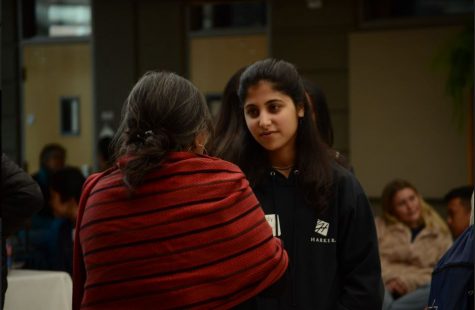
Sophomore Melody Yazdi talks with another attendee. The Diversity Committee originally came up with the idea of holding such a gathering at Harker after they were unable to secure spots at the Student Diversity Leadership Conference (SDLC) in Nashville last year.
Not only did the set-up affect participants, but conversations about videos that Dr. Glasgow showed them while in the fishbowl set-up also brought in some new revelations.
“We don’t talk a lot about this here, because we are considered a diverse school compared to others, but there’s a lot of issues that people hold inside and they don’t express, but I think that’s a human thing—we all have something,” Brown said. “So if we can all just talk to each other and learn something new about each other, I think we’re getting to getting along.”
Even for those who had experienced it before, it still had an impact.
“What I didn’t know was what was going to be the spark, and then all of a sudden, it was like boom, the realness was in the room, and it was in there in such a way that even I felt it, so this was one … of the first times that I felt myself being a participant, even coming out of facilitator mode it was so powerful,” said Glasgow.


















![“[Building nerf blasters] became this outlet of creativity for me that hasn't been matched by anything else. The process [of] making a build complete to your desire is such a painstakingly difficult process, but I've had to learn from [the skills needed from] soldering to proper painting. There's so many different options for everything, if you think about it, it exists. The best part is [that] if it doesn't exist, you can build it yourself," Ishaan Parate said.](https://harkeraquila.com/wp-content/uploads/2022/08/DSC_8149-900x604.jpg)




![“When I came into high school, I was ready to be a follower. But DECA was a game changer for me. It helped me overcome my fear of public speaking, and it's played such a major role in who I've become today. To be able to successfully lead a chapter of 150 students, an officer team and be one of the upperclassmen I once really admired is something I'm [really] proud of,” Anvitha Tummala ('21) said.](https://harkeraquila.com/wp-content/uploads/2021/07/Screen-Shot-2021-07-25-at-9.50.05-AM-900x594.png)







![“I think getting up in the morning and having a sense of purpose [is exciting]. I think without a certain amount of drive, life is kind of obsolete and mundane, and I think having that every single day is what makes each day unique and kind of makes life exciting,” Neymika Jain (12) said.](https://harkeraquila.com/wp-content/uploads/2017/06/Screen-Shot-2017-06-03-at-4.54.16-PM.png)








![“My slogan is ‘slow feet, don’t eat, and I’m hungry.’ You need to run fast to get where you are–you aren't going to get those championships if you aren't fast,” Angel Cervantes (12) said. “I want to do well in school on my tests and in track and win championships for my team. I live by that, [and] I can do that anywhere: in the classroom or on the field.”](https://harkeraquila.com/wp-content/uploads/2018/06/DSC5146-900x601.jpg)
![“[Volleyball has] taught me how to fall correctly, and another thing it taught is that you don’t have to be the best at something to be good at it. If you just hit the ball in a smart way, then it still scores points and you’re good at it. You could be a background player and still make a much bigger impact on the team than you would think,” Anya Gert (’20) said.](https://harkeraquila.com/wp-content/uploads/2020/06/AnnaGert_JinTuan_HoHPhotoEdited-600x900.jpeg)

![“I'm not nearly there yet, but [my confidence has] definitely been getting better since I was pretty shy and timid coming into Harker my freshman year. I know that there's a lot of people that are really confident in what they do, and I really admire them. Everyone's so driven and that has really pushed me to kind of try to find my own place in high school and be more confident,” Alyssa Huang (’20) said.](https://harkeraquila.com/wp-content/uploads/2020/06/AlyssaHuang_EmilyChen_HoHPhoto-900x749.jpeg)



